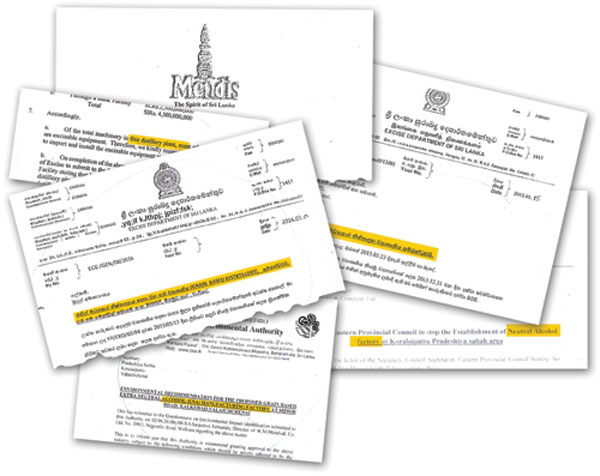News
Opposition ferments against Mendis distillery
Resistance is growing in the East to W.M. Mendis’s (WMM) proposed ethyl alcohol plant, approved by the Finance Ministry within 18 months of Maithripala Sirisena winning the presidency, on a platform that decried, among other things, “the ethanol mafia”.
The Batticaloa District Coordinating Committee met on March 27 and resolved to oppose the project. Members wanted it removed from the Batticaloa District and addressed a memorandum to President Sirisena, Prime Minister Ranil Wickremesinghe and other ministers. “Everyone in the Batticaloa District, including ministers, MPs and members of Provincial Councils, are unanimous in their opposition to the project,” a local Government official said. A spokesman for the Excise Dept said this week that WMM–owned by Arjun Aloysius, son-in-law of former Central Bank Governor Arjuna Mahendran who is currently being investigated over the Bond issue–has not yet been issued a manufacturing licence for the plant. “They are still in construction stage,” the official said.
Meanwhile, WMM published notices in the local media stating that, the said plant will produce ethyl and is not a distillery. Ethyl is also known as ethanol, grain alcohol or, alcohol.
It said that the ethyl manufactured from the plant, using corn, will be used as a substitute for imports, “saving valuable foreign exchange”. “The sale or export of excess, beyond the requirement of WMM, if any, will be undertaken with necessary approvals from relevant authorities (Excise Dept and Customs Dept).
It is unlikely that either Dept–both controlled by Finance Minister Ravi Karunanayake–will pose a challenge to the WMM operation. The Fiscal Policy Dept of the Ministry of Finance notified the Excise Dept of its approval for the grain-based extra neutral alcohol (ENA) plant as early as May 2015. The Excise Dept gave its clearance just two days later, on May 15.
The clearance was issued despite President Sirisena pledging during his election campaign to eradicate the ethanol mafia. His manifesto blamed the previous regime for helping the ethanol and methanol business to flourish. “Cliques connected with drugs and liquor were invited and accommodated in politics, while our people who were victims of those substances suffered heavily,” it said. “These drug and liquor businessmen were given Cabinet and other ministerial portfolios in the Alliance Govt. It is by spending a minute fraction of the billion-fold income earned from drugs and liquor that useless political propaganda is being conducted throughout the country today.”
WMM is also set to receive a generous 100% capital allowance for locating its proposed Rs 4 billion distillery in Kalkudah (documentation from the Excise Dept and others refer to the plant as a “distillery”). The 2017 Budget grants a 100% capital allowance on fixed investment of not less than US$ 3 million in fixed assets in the Uva and Eastern Provinces.
The respective venture must also create at least 250 jobs. In its simplest form, a capital allowance is defined as “the practice of allowing a certain amount of money spent by a company on fixed assets to be taken off the profits of the company, before tax is imposed”. In its newspaper notice, WMM clearly states that, the “direct job creation is estimated at approximately 250, while indirect jobs are estimated in excess of 5,000”.
The ENA plant will manufacture ethanol, which is needed to make alcoholic beverages. Only four companies have the licence to distil arrack in Sri Lanka. Ethanol is imported for the purpose. “What is likely to happen is that, the Govt. will introduce a higher tax on ethanol, forcing others to buy from WMM,” an industry source said. This would also enable WMM to gain control of the market.
WMM, thus, continues to maintain its “favoured status” under the new Govt. Recently, the Paddy Marketing Board (PMB) sold paddy stocks stored at Mattala Rajapaksa International Airport to WMM at a cut-rate price. The paddy was hawked off to WMM at Rs 24 per kg. The PMB had bought the stocks for between Rs 38 and 42 a kg. The loss sustained by the PMB is, therefore, between Rs 14 and 18 per kg.
The total quantity of paddy sold was 590 metric tonnes or 590,000 kg, said PMB Chairman M.B. Dissanayake, claiming it was pushed off to WMM because other buyers could not be found. This means that, the loss sustained by the PMB–which falls within the Rural Economic Affairs portfolio of Minister P. Harrison–is between Rs 8,260,000 and Rs 10,620,000


